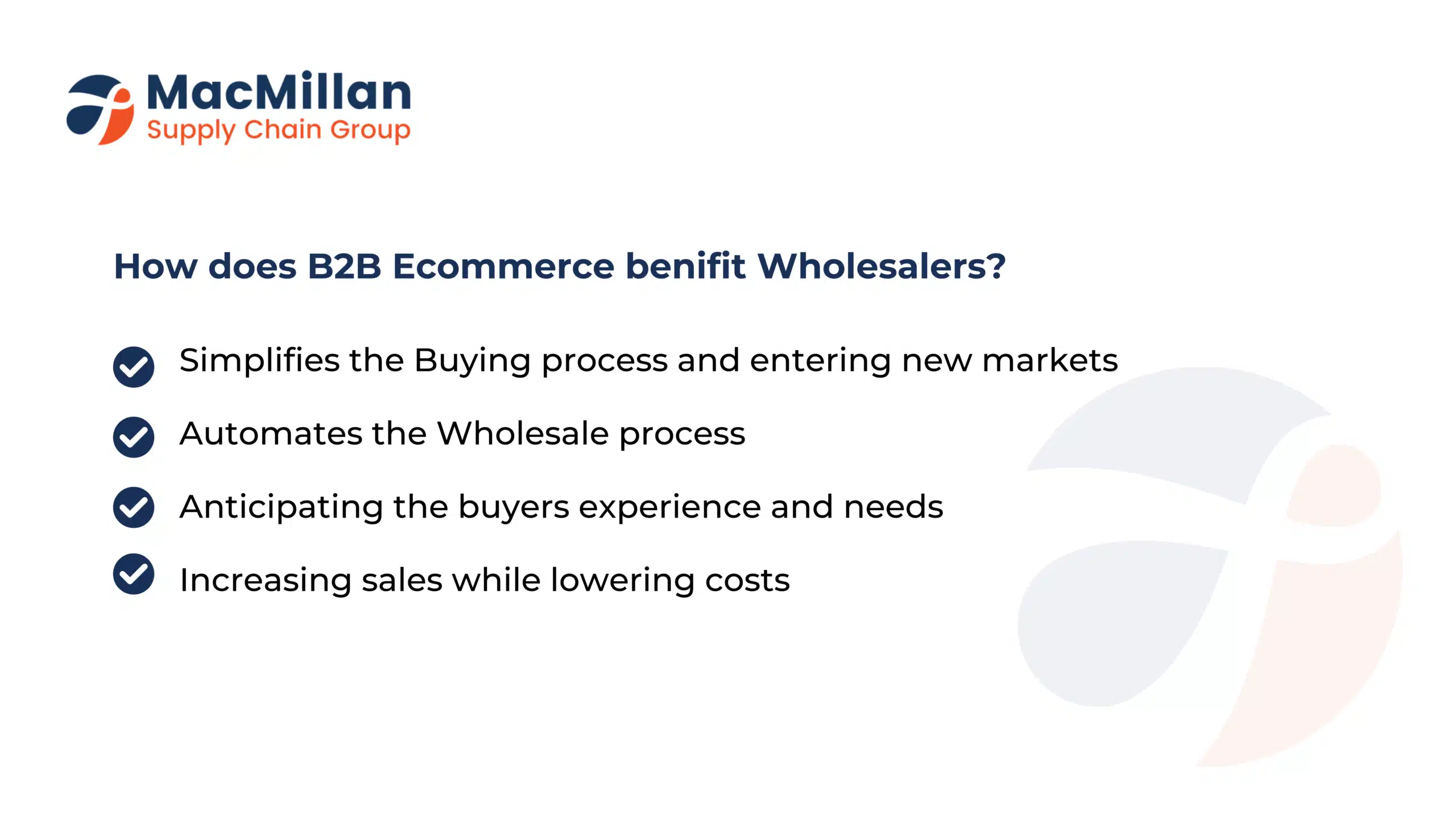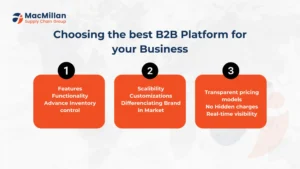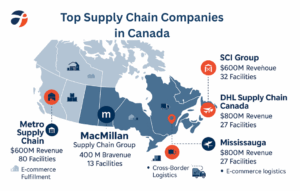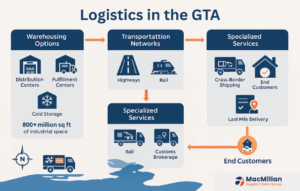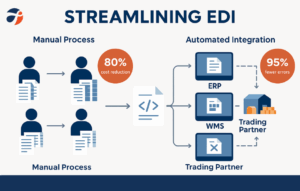In today’s Wholesale Ecommerce landscape, direct-to-consumer sales often take center stage. We typically think of placing an order online and having it delivered straight to our homes. However, selling Ecommerce bulk online is rapidly gaining traction as a prevalent ecommerce model.
Multichannel retailing solutions have enabled many DTC brands to expand into wholesale services, allowing them to generate additional revenue and enhance brand recognition by catering to other businesses.
In this article, we delve into the concept of wholesale ecommerce, its operational mechanics, and provide a comparison of some of the best wholesale ecommerce platforms available for your business.
Unlocking New Revenue Streams with Wholesale Ecommerce
Wholesale ecommerce involves selling products in bulk to other businesses, rather than directly to individual consumers. Notably, B2B or wholesale ecommerce grew 1.17 times faster than the overall growth in manufacturing and distribution sales, with a 15.2% year-over-year increase (Digital Commerce 360).
This process is facilitated through online platforms where businesses place orders with wholesalers, who in turn sell the goods at discounted prices. Essentially, wholesalers act as intermediaries between retailers and manufacturers. Retail ecommerce businesses purchase goods in bulk from wholesalers, benefiting from reduced prices.
The advantages are evident: higher order volumes and reduced time spent on manual entry and administrative tasks. Becoming a wholesaler allows you to tap into this vast market, creating new revenue streams for your business.
How Wholesale Ecommerce Works
- Online Platforms: Businesses browse online wholesale platforms to find and compare products from various suppliers.
- Order Placement: Orders are placed in bulk, ensuring significant cost savings for the buyer.
- Intermediary Role: Wholesalers buy products from manufacturers and sell them to retailers, streamlining the supply chain.
- Access to Suppliers: Ecommerce businesses gain access to a wide variety of suppliers, allowing them to compare prices and diversify their product offerings.
- Benefits
- For Retailers: Easier access to a broad range of products and suppliers, enabling price comparison and product diversification.
- For Manufacturers: Reduced burden of finding retailers to distribute their products to end consumers.
In summary, wholesale ecommerce simplifies the supply chain, making it easier for retailers to source products and for manufacturers to reach a wider market.
Wholesale ecommerce platforms are specialised online marketplaces that facilitate bulk ecommerce transactions between businesses. Designed to meet the unique needs of B2B operations, these platforms offer features such as customised pricing, bulk ordering, and integration with inventory management systems. Key functionalities include product catalog management, streamlined order processing, and robust customer management tools, making them essential for businesses seeking to optimize their supply chains and scale their operations.
How does B2B Ecommerce Benefit Wholesalers?
Historically, it was believed that B2B customers avoided digital channels due to the complexity of wholesale transactions. This perception has led many suppliers to delay investing in ecommerce. However, recent McKinsey research shows that B2B buyers have evolved. With easier access to information through digital channels, buyers now gather information independently, reducing wholesalers’ opportunities to influence decisions in person.
B2B ecommerce platforms have transformed how wholesalers operate online, offering several key benefits:
Simplifies the Buying Process
Many wholesalers view ecommerce as unsuitable due to the complex nature of B2B transactions, which often involve contract pricing, product exclusivity, and special terms and conditions. While these concerns are valid, the right wholesale ecommerce platform can address these challenges and promote business growth. By creating a private B2B ecommerce website, wholesalers can provide clients with all necessary information, eliminating the need for basic inquiries and streamlining the purchasing process.
Automates Wholesale Processes
One of the biggest advantages of modern wholesale ecommerce is automation. From signup to checkout, ecommerce automation reduces the time spent managing orders via phone and email, allowing wholesalers to focus on strategic business needs. They can place orders at their convenience and track their order status, saving time and effort.
Embracing B2B ecommerce enables wholesalers to streamline operations, enhance customer experience, and drive growth in the digital age.
Today’s ecommerce technology, such as Due Trade’s B2B wholesale app, offers a range of tools that can transform your wholesale operations:
- Custom Pricing and Discounts: Easily create tailored pricing and percentage discounts for specific customers or groups.
- Automated Customer Signups: Streamline and review customer signups effortlessly.
- Order Management: Allow customers to purchase, track, and reorder products with ease.
- Order Review: Review orders before invoicing to ensure accuracy.
- Inventory Management: Simplify inventory and order management processes.
Enhancing the Buyer Experience
B2B buyers now expect the same high level of service as B2C customers. Armed with information, they prefer simple onboarding and ordering experiences without needing to speak to a representative. Research from Demand Gen Report shows:
67% of B2B buyers want easy access to wholesale pricing.
64% require easy access to content without registration forms.
66% are influenced by websites that cater to specific industry needs.
Anticipating Buyers’ Needs
Ecommerce technology helps wholesalers anticipate and meet buyers’ needs by aiding their research process and ensuring easy access to relevant content throughout the buying journey.
Increasing Sales While Lowering Costs
Selling wholesale online accelerates business growth. For manufacturers, bulk ecommerce selling increases product volume and lowers the cost-per-unit, boosting profit margins. Bulk shipping to fewer customers also reduces fulfillment costs.
Entering New Markets
Expanding into new regions presents logistical and marketing challenges. Partnering with an established top-tier company such as MacMillan can mitigate risks and lower setup costs by leveraging their supply chain and customer base, saving on marketing expenses.
Streamlined Ordering
Wholesale ecommerce platforms enable businesses to place bulk orders quickly and effortlessly, reducing the time and effort needed to manage orders manually.
Top B2B Wholesale Ecommerce Platforms
1. Magento
Magento is a leading ecommerce platform renowned for its advanced features and flexibility tailored to B2B businesses. With a wide array of extensions and integrations, it is an excellent choice for wholesale ecommerce operations seeking robust and customizable solutions.
2. Shopify
Shopify is a well-known ecommerce platform that provides a comprehensive range of features and integrations to manage online sales efficiently. Its growing B2B capabilities make it an ideal option for small to medium-sized wholesale businesses looking for an accessible and scalable solution.
3. Alibaba
Alibaba is a dominant name in the wholesale industry and often the go-to platform for newcomers. This China-based marketplace provides access to a vast array of products from suppliers, making it a prime destination for sourcing goods. Additionally, wholesalers can list their products on Alibaba, reaching retailers across the globe.
4. WooCommerce
WooCommerce is a free ecommerce platform that seamlessly integrates with WordPress, allowing you to create a robust online store. With a wide range of extensions and integrations, it is an excellent choice for wholesale ecommerce businesses seeking flexibility and customization.
5. BigCommerce
BigCommerce is a robust ecommerce platform designed with a variety of features tailored for B2B businesses. It boasts a user-friendly interface and offers numerous integrations and apps to streamline business operations, making it an excellent choice for managing wholesale ecommerce efficiently.
How to Choose the Best B2B Platform for Your Wholesale Business
Selecting the right B2B platform for your wholesale business can be challenging with so many options available. To make an informed decision, it’s essential to identify your specific needs and requirements. Here are some key factors to consider:
1. Features and Functionality: Evaluate the features and functionalities each platform offers. Identify what your business needs, such as advanced inventory management or seamless order processing and choose a platform like Macmillan that meets your requirements.
2. Scalability: As your business grows, your platform should be able to grow with you. opt for a platform that can scale up or down based on your evolving business needs.
3. Customization: Your B2B platform should allow for customization and personalization. This capability helps create a unique experience for your customers and differentiates your brand in the market.
4. Pricing: Consider the pricing models of various B2B platforms. Assess your budget and select a platform that offers the best value for your investment. MacMillan offers transparent pricing models with no hidden fees.
By thoroughly evaluating your needs and exploring your options, you can choose a B2B platform that best supports the growth and success of your wholesale business.
How MacMillan Streamlines Operations for your Businesses
Setting up a wholesale ecommerce business involves overcoming various challenges, particularly in handling higher order volumes and logistics. Order fulfillment is a critical hurdle, but MacMillan simplifies B2B fulfillment and logistics solutions, allowing you to streamline operations.
By outsourcing your wholesale fulfillment process to MacMillan, you avoid the financial and logistical complexities of maintaining an in-house team. The platform automatically processes new orders and creates packing slips, reducing manual work and paperwork, and ensuring timely delivery to your retail partners with integrated systems such as WMS for customer satisfaction and response.
Key Take Aways
The rise of wholesale ecommerce presents a compelling opportunity for businesses to tap into new revenue streams and optimize their supply chains. By leveraging specialized B2B ecommerce platforms, businesses can streamline operations, automate processes, and enhance customer experiences. These platforms facilitate bulk transactions, enabling wholesalers to cater to a broader market while reducing operational costs.
The transformation of B2B sales through digital channels underscores the evolving needs of buyers, who now demand seamless, information-rich interactions. As the ecommerce landscape continues to evolve, adopting robust wholesale platforms like Magento, Shopify, and MacMillan can drive growth and efficiency, positioning businesses for sustained success in the digital age.


